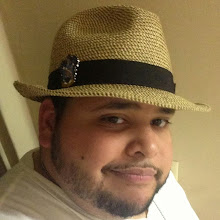I'm particularly grateful to Edwin Torres for responding in this space about some of the curatorial conversation going back and forth in the summertime. I think it's also important to note for the record here that none of my commentary was meant to demonize particular artists or shame them from using a particular word. As is usually the case, my beef is with management: How can an institution impose that word on an artistic endeavor? My belief is still that the artists here were forced to respond to this thing in a particularly improvised and unexpected way and PLACE a context on the title. That context was not the Museo's choice. Their choices, as I've said before, revolved around marketing this show as little more than "hot word wizardry" and "Latino spoken word."
I've yet to receive the official response from Museo's management, but they are aware of the community's concern (many letters have been written) and are in the midst of trying to get back to me.
Meanwhile, let me add this little nugget to the discussion, one which I missed completely at the time.
Another program of El Museo's entitled "Oh Snap: Young Powerful Voices At Work" allows teens to participate in a spoken word workshop and then perform their work at the aforementioned Spic Up show. The text on the advertising for this program is as follows:
The Peace Poets, a community based arts collective from New York City, facilitate a two-hour spoken word workshop for teens. Right after the workshops! Participating youth will share their work with the public as part of El Museo's spoken word series SPIC UP/SPEAK OUT!
So it is that Museo has sponsored a community writers' workshop, the stated goal of which is to get teens to perform at the Spic Up show. This again with no intellectual context or linguistic niche offered as explanation. This is particularly insidious, in my book, because now we are offering our teens a chance to spread the word: "spic" is not only acceptable to name a show with and use in regular conversation, but now it just might get you a chance to shine in front of an audience.
The more I think about this, the less I like it. And the less I like it, the less patient I become.


1 comment:
Strange and deeply troubling to see this unfold. This is a theme that I have been running into over and over again when people look at my work from the 80's in the South Bronx. This glorification of the cut back of services and urban decay that beset our community during that time is distressing to me. It covers over the fact of the violence that was done to the Puerto Rican community by a city, state and nation that turned their backs on us and let us get burnt out of our homes.
I mention to someone that this was the closet thing to a pogrom that has taken place in the United States and hasn't been talked about since except as some fond sort of reclaimed memory from the younger generation. The use of the word spic was as deadly as the use of the word nigger and the response to it's use was violent in every sense of the word.
I have no desire to see it getting used as some cool way of identifying ourselves and our children like the young girl mention in David Gonzalez piece. Some one correctly pointed out it was a comatose epithet and should only be used as such.
Manny Xavier comments to Gonzalez
“We never went through the atrocities of slavery,” Mr. Xavier said. “We do not have the right to use that word (nigger) among ourselves. But spic is a word that we can re-appropriate, that was used to oppress us and box us in a negative way.”
Why the fuck would we want to do that? How do I tell Mr. Xavier about the how the streets of the South Bronx was awash with the blood of Blacks and Latinos and that an entire nation turned their backs on the "niggers and spics" and reduced us to nothing more then animals?
Why shouldn't we have such a vehement reaction to it use when the effects of that time is still being felt in our communities, tucked away in our hearts like a dirty little secret that festers until it comes out in full rage when some fool would use the very tools that kept us down? How does he respond to that young woman who wants to tattoo her arm with SWA? And all the others that won't be stopped because of their lack of connection to oppression of the fathers and mothers?
I have no need to re-appropriate it. I want it to take it place in history like these other words, racism, hatred, genocide and holocaust and use it as a reminder of what happens when we forget history.
Post a Comment